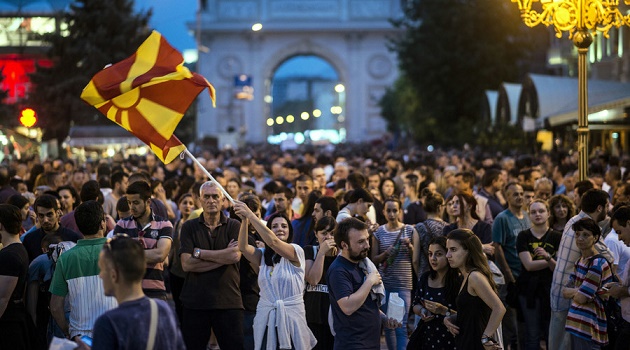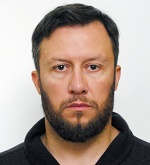The Macedonian crisis and the role of the evangelical community
“The basic nature of the Macedonian crisis is moral”, says Nikola Galevski, a pastor in Skopje. “Pray that the church will clearly see its specific calling for a time like this”.
08 FEBRUARY 2017 · 18:01 CET

Macedonia is in the midst of a social crisis that has reached a high point after the December election. Efforts to form a new government have failed.
Evangelicals are a small community, but one that could make a positive difference in the country, evangelical pastor Nikola Galevski told Evangelical Focus.
“The basic nature of the Macedonian crisis is moral. Everything else is a natural outcome of this basic fact. What we see on the surface is a lack of economic development and ethnic tensions between Macedonians and Albanians, but the crisis is nonetheless moral”.
“It is an inability to work for the common good that goes well beyond the interests of my families, my clan, and my ethnic group. It is a failure to love your neighbor as yourself”.
Galevski is a pastor of the Evangelical Church Soulcraft (Skopje), as well as a lecturer at the IFES’ summer school “Bible and Culture” and at the newly established Evangelical Theological Institute in Kumanovo, Macedonia.
He responded to questions of Evangelical Focus in the following interview.

Answer. A robust crisis has been the main feature of the Macedonian politics in the last two years. The crisis stemmed from the entrenched conflict between the largest Macedonian ruling party and the largest Macedonian opposition party, based in part on corruption allegations.
At the same time, the Albanian parties have put forward a platform with ethnic demands that should have already received their final resolution in the so-called “Ohrid Framework Agreement” that the representatives of the major ethnic Macedonian and ethnic Albanians political parties signed to end the Macedonian-Albanian conflict in 2001.
The crisis should have ended in the elections of December 2016, but it extends until today due to the difficulty in creating a stable government due to the tight election results.
Both major parties claimed victory and in an atmosphere of mutual hatred and threats that, at few points, almost spilled over into an open conflict.
The third major root of tension is the weak economy. The formula of roughly 30% unemployment rate combined with the minimal guaranteed salary of ca. 150 EUR creates an atmosphere despair and feelings of insecurity to the vast majority of the Macedonian citizens. Due to such trends, a good number of younger Macedonian citizens have left the country.
But these are the symptoms, as I already stated, of a deeper problem.
Q. Are there many evangelical Christians in the country?
A. Due to the fact that the last census has been unsuccessful, it is difficult to tell exactly how many evangelical Christians are there in Macedonia.
But my estimate would be anywhere from 3,000 to 5,000, which is about 0.3 percent of the Macedonian population.
Q. Are the majority of these believers Macedonians or Albanians?
A. The vast majority of the evangelical believers in Macedonia are Macedonians, with the Roma population being the second largest evangelical group.
To my knowledge, there are very few Macedonian Albanian evangelical believers in Macedonia.
Q. Are these Christians participating in the social debates? To they express their views on Facebok or Twitter? Do they join demonstrations?
A. The citizens of the Balkans and Macedonia in general, and the evangelical Christians in particular, display a strong interest in politics.
The Macedonian evangelical believers are active and enthusiastic when it comes to interacting with global, regional, and national issues on the social media, especially on Facebook.
Taking part in demonstrations is not an unlikely step, sometimes joining opposing demonstration crowds and causes.
Q. How can we pray for Macedonia and the positive role of the Christians there?
A. Prayers in the following areas would be much appreciated:
1. Instrumentalising our maturity. The evangelical community in Macedonia is fairly small, but very capable, well-educated, and gifted. The prayer is needed for the Macedonian evangelical believers to understand that all that God needs for a gospel-breakthrough in Macedonia is already in the country.
2. Wisdom. That the church would avoid the equally dangerous perils of being under-politicized and over-politicized. To be able to clearly see its specific calling for a time like this.
3. Long-term political stability. We need a resolution of the Macedonian-Greek “name dispute” which has been preventing Macedonia in fulfilling its EU and NATO aspirations for almost three decades. Please pray that we will not experience new situations of inter-ethnic conflicts, waves of refugees, and economic disasters due to corruption, situations that have been thinning the rope on which the Macedonian future hangs on a daily basis.
ABOUT NIKOLA GALEVSKI
Nikola was born in Skopje, in a Macedonian Orthodox family. “I decided to become a follower of Christ at the age of 14 through the witness of the Evangelical Church in Skopje. It was during my high school years that I discovered that the love for God is producing twofold fruit in me; passion for the church, and a passion for academia and research”.
He graduated with BA in Archaeology and Art History, and did his Masters in Christian Studies at Regent College in Vancouver (Canada). After he returned to Skopje, he served as a national director SEAM EXODUS (the International Fellowship of the Evangelical Students in Macedonia) from 2005-2013. He also planted a church in Skopje downtown named Evangelical Church Soulcraft.
He is the Lausanne Movement national coordinator for Macedonia, member of the university evangelists fellowship “FEUER”, as well as a lecturer in the area of New Testament and Urban Ministry IFES summer school “Bible and Culture” and the Evangelical Theological Institute in Kumanovo, Macedonia.
Published in: Evangelical Focus - europe - The Macedonian crisis and the role of the evangelical community
